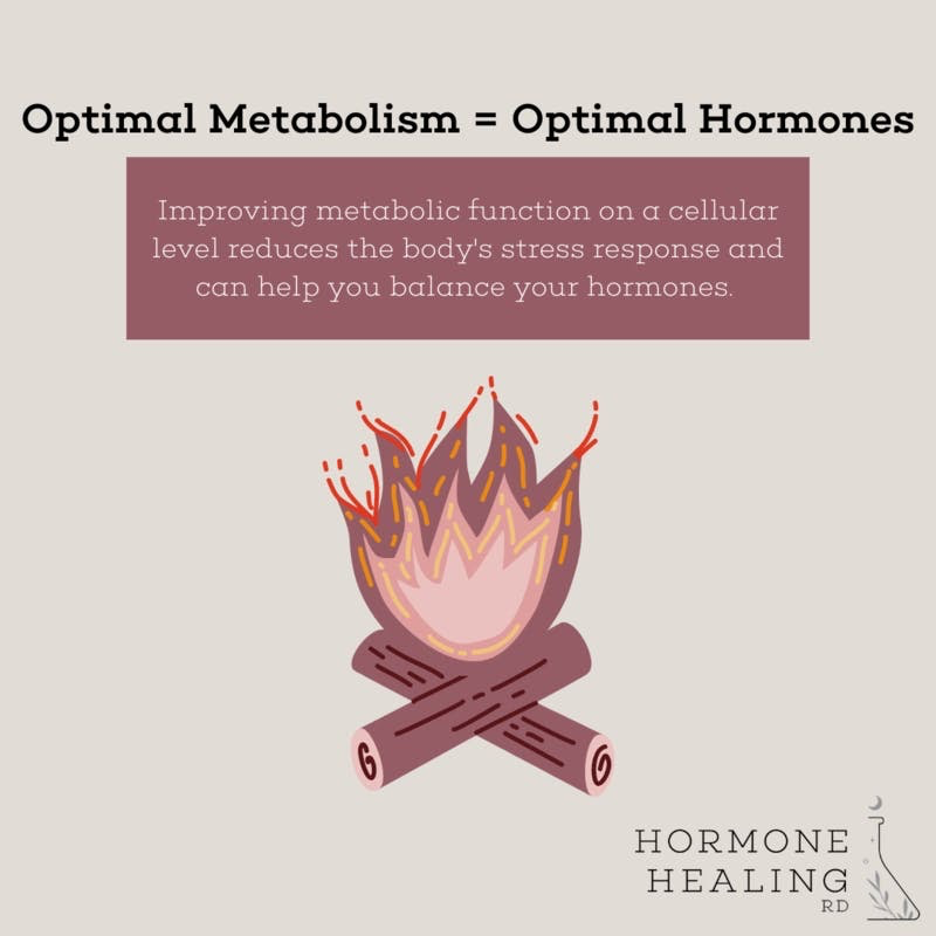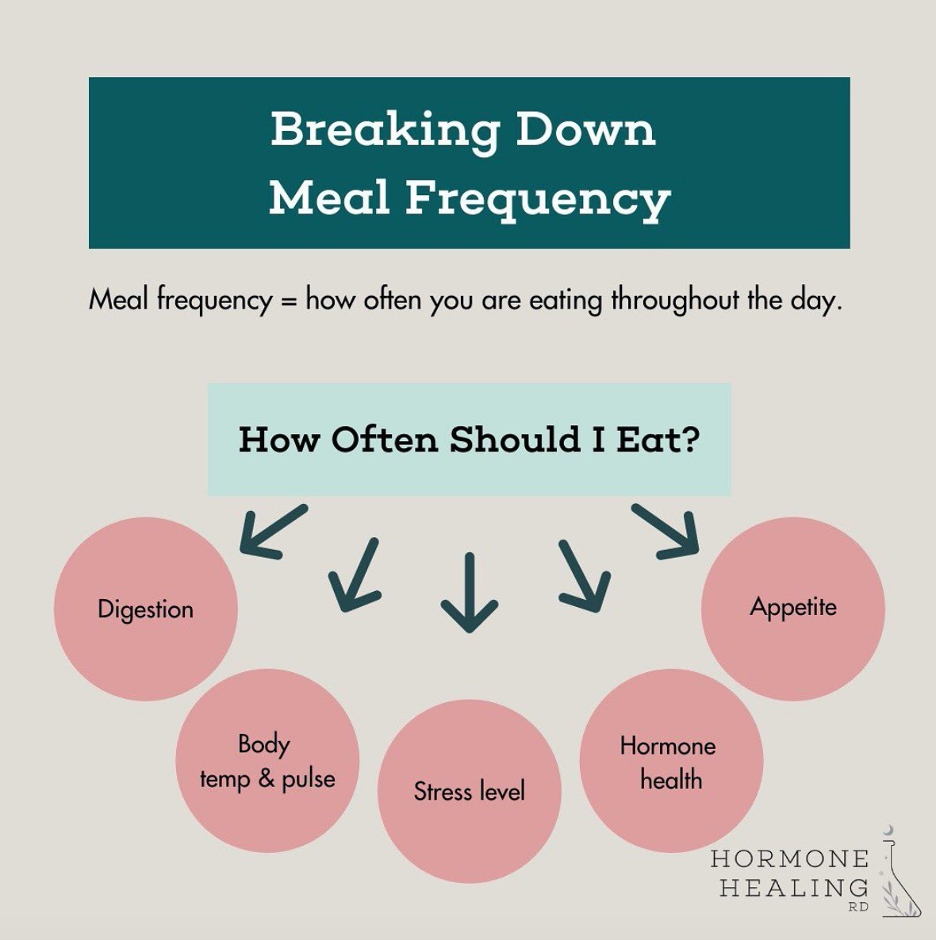I hit some trigger points in one of my Instagram posts, where I recommended eating every 3-5 hours. I was expecting some push back, but not nasty comments (I deleted them; I can’t waste energy on rude people when I am on a mission to educate as many women as possible). Of course, I have some thoughts on this and decided to make this blog since I think it’s essential to get into more of the WHY behind eating regularly and what that can look like for different people.
First things first, why might we need to eat more frequently? This goes back to a cellular level in the body–our metabolism. I know many of us tend to think of how many calories we are burning when we think of the word metabolism but stick with me. I’m talking about the metabolism of our cells. Each of our cells has a little engine that uses the nutrients we give to run all of the different processes in the body. When these engines slow down, everything slows down—hormone production (leading to hormone imbalances), digestion, detoxification, thyroid function, etc. What can help repair these slow engines in our cells? The answer, reducing stress, eating enough, and eating more frequently. This improvement in the engines’ functions in our cells can help support healthy digestion and healthy hormones. Who doesn’t want that?

What are the signs of a low metabolism?
Poor Blood Sugar Balance
From previous blogs, you might remember that I talked about managing stress in the body as the number one way to correct and prevent hormone imbalances. One of the most common stressors that we all experience is blood sugar imbalances. Blood sugar imbalances impact us all on varying degrees based on how our metabolisms are currently working.
If you experience the sudden urge of hunger, get hangry between meals, or get significant dips in energy, this typically means that your metabolism is compromised and that your liver isn’t working correctly. Our liver should break down some stored glucose (AKA glycogen) to give us energy when our blood sugar drops. I often see that once we get to the point of hormone imbalance, our bodies are so stressed that they aren’t storing glucose properly. This leads to even greater stress on the body than your typical low blood sugar because you no longer have the resources to respond to it.
This further exacerbates hormone imbalances and is why I recommend eating every 3-5 hours for most women. If you have lots of PMS, irregular cycles, low energy, wake during the night, etc. then eat closer to the 3-4 hour mark if possible. This allows your liver to get consistent glucose and will rebuild your stores. Ideally, you don’t need to eat every 3 hours forever. A flexible metabolism will adjust, but it’s typically because we have lost that flexibility when we struggle with hormone imbalances.

Our Bodies Love a Routine
Whether it’s your sex hormones, adrenal glands, or digestive system, they all love routine and tend to function better when we have a somewhat consistent routine. This doesn’t mean we need to eat at precisely the same times every single day, but if you eat 3-5 times a day most days, then it’s best to continue this as often as possible. When we aim to eat every 3-5 hours, we are giving our bodies this routine. This is a fantastic way for our metabolisms to recover and stay healthy and reduce stress on the body.
What if I feel awful when I eat more frequently?
If you are currently only eating two meals a day, then you wouldn’t want to jump to eating 4-5 times a day immediately. You would first want to try three meals a day and aim to be consistent (see above). Then you can slowly start eating more frequently to help improve energy and sleep and reduce stress on the body. If you’re eating three meals a day consistently, but still experience hormone imbalances and don’t feel your best, try adding in a snack during your most extended break between meals and see how you feel.
If you are already metabolically flexible and have balanced hormones, you don’t need to do this. I will say, though, that sometimes healing doesn’t always feel good. Sometimes you might gain a little bit of weight, have energy go down, or more PMS. This is often because the body adjusts to having the proper amount of energy and nutrients to repair. It doesn’t happen overnight.
How do I know if it’s working?
If healing takes time and you might not immediately feel better, how do you know if you’re moving in the right direction? A lot of it is paying attention to specific biomarkers like your energy, mood, sex drive, PMS symptoms, workout recovery (or energy to workout in the first place), but monitoring things like body temperature and pulse is often helpful for making nutrition adjustments.
You can use highs and lows in body temperature and pulse to know if you need more carbs (or food in general) at a meal or if you might need to eat more frequently than you are. Using them together allows you to see if your body has warmed up or if your meals might be causing more stress. Want to get to the root cause of your hormone imbalance once and for all? I go over how to optimize your metabolism in detail in my Master Your Minerals course, in which you’ll learn how to interpret your own HTMA and build a hormone-healing protocol based on your unique results.
Diets are a short term fix to a long term problem. I want to help you remove fears around food and learn how to feed your body to support healthy hormones long term. It’s not as complicated as the internet makes it seem, but making it personal to you helps. Being consistent is vital. Make your eating habits a daily routine to ensure adequate and consistent fuel for your body.
Photo by Obi Onyeador on Unsplash
